City Contours Bremen
Bremen isn’t Hamburg – but so what?!
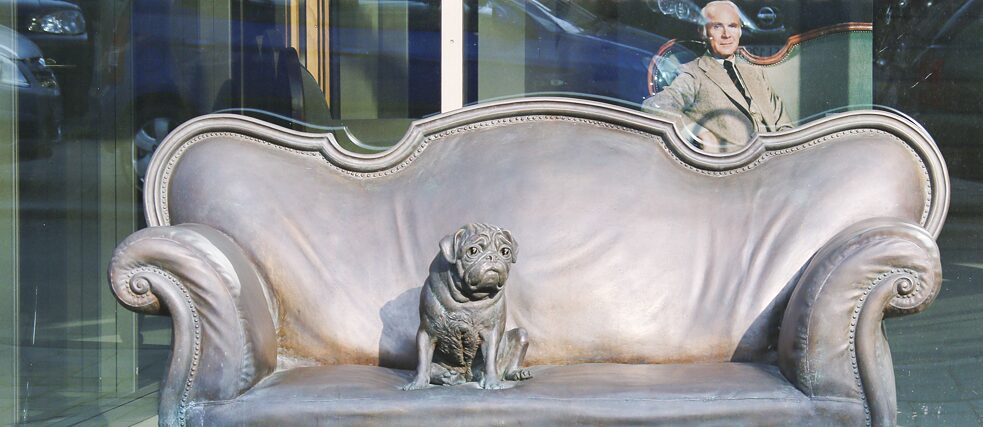
No more than a traditional Hanseatic city with a hotly disputed beer? This port city has many more surprises in store than just four musical animals and the Weser River. Our author Hinnerk Köhn thinks Hamburg, Cologne and Berlin would do well to take a page out of Bremen’s book.
By Hinnerk Köhn
Kettle drums, trumpets and a cock-a-doodle-do
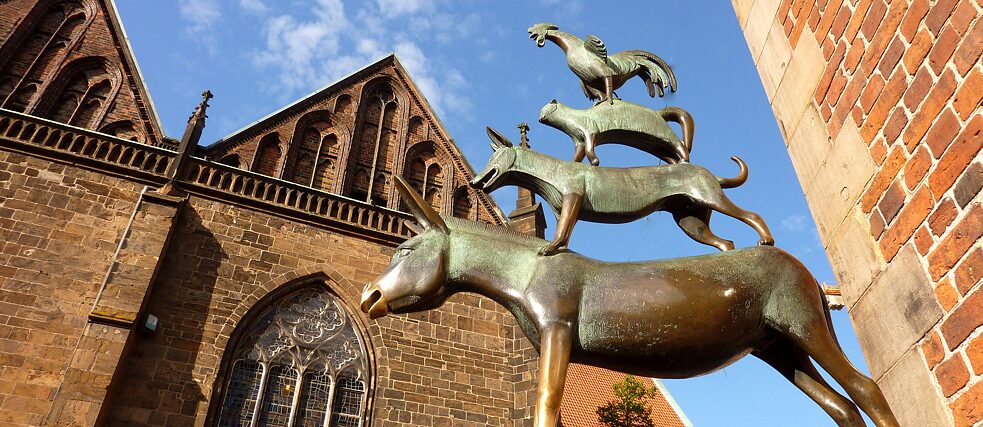 The Bremen Town Musicians are so beloved that their faces grace advertising for the city.
| Photo (detail): © Adobe/ globetrotter1
Everyone in Germany knows the famous words spoken by the donkey in the fairy tale The Bremen Town Musicians: “You can find something better than death everywhere”. And Bremen, it has to be said, is considerably better than death. Gerhard Marcks erected a statue to the animal fab four in front of city hall in honour of the fame the tale brought the city (tip: go there, take a photo, and get on with your day). The background to the fairy tale is less well known than the talented animals in front of city hall, who did not choose to flee to Bremen to escape their owners and the upcoming slaughter just because it was close. In the 19th century, when the Brothers Grimm published the fairy tale, Bremen was seen as the gateway to the world, the port to overseas, a place of endless possibilities, just like the donkey, cat, dog and rooster imagined it to be. Today the Bremen Town Musicians are so beloved that their faces grace advertising for the city. Bremen is well worth an enthusiastic cock-a-doodle-do!
The Bremen Town Musicians are so beloved that their faces grace advertising for the city.
| Photo (detail): © Adobe/ globetrotter1
Everyone in Germany knows the famous words spoken by the donkey in the fairy tale The Bremen Town Musicians: “You can find something better than death everywhere”. And Bremen, it has to be said, is considerably better than death. Gerhard Marcks erected a statue to the animal fab four in front of city hall in honour of the fame the tale brought the city (tip: go there, take a photo, and get on with your day). The background to the fairy tale is less well known than the talented animals in front of city hall, who did not choose to flee to Bremen to escape their owners and the upcoming slaughter just because it was close. In the 19th century, when the Brothers Grimm published the fairy tale, Bremen was seen as the gateway to the world, the port to overseas, a place of endless possibilities, just like the donkey, cat, dog and rooster imagined it to be. Today the Bremen Town Musicians are so beloved that their faces grace advertising for the city. Bremen is well worth an enthusiastic cock-a-doodle-do!
Are we in the quarter or in the quarter?
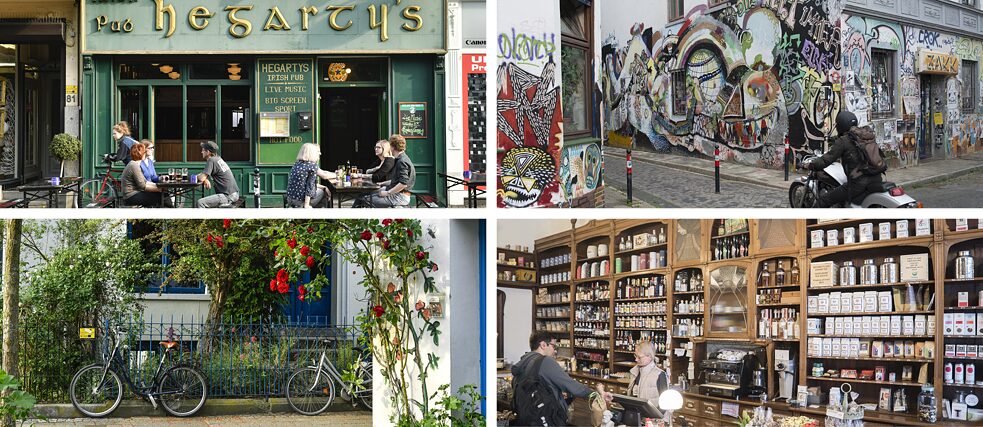 The Viertel, a place of cultural diversity, song and dance, is filled with bars and pubs.
| Photo (detail): © picture-alliance / left: Bildagentur-online, Schoening / top right: DUMONT Bildarchiv / bottom right: Robert B. Fishman, dpa
The highest concentration of bars is probably in what Bremen residents call the Viertel or quarter. This colloquial designation is confusing for outsiders, since the Viertel, a place of cultural diversity, song and dance, is made up of parts of the Ostertor and Steintor quarters. Filled with bars and pubs, it is more popular and elegant than the Kiez in Hamburg or Kreuzberg in Berlin. Instead of yawning urban canyons and hipsterfied cafes, visitors here enjoy a wonderful mix of urban life, winding alleyways and a bit of the mainstream. The area is cool and hip, but you can still ask for regular milk in a café without attracting weird looks. But don’t get the wrong idea: staying entirely sober throughout the evening is not just a good trick; it is nigh on impossible. In wee hours of the morning, the hotdog stand feeds hungry denizens of the night of both the carnivorous and the vegan variety. The Viertel’s diversity is most visible in the contrast between night and day. The party mood in the twilight hours and beyond will rob anyone of their sleep, while during the day art lovers wander from gallery to gallery often with a little side trip to Bremen’s art museum.
The Viertel, a place of cultural diversity, song and dance, is filled with bars and pubs.
| Photo (detail): © picture-alliance / left: Bildagentur-online, Schoening / top right: DUMONT Bildarchiv / bottom right: Robert B. Fishman, dpa
The highest concentration of bars is probably in what Bremen residents call the Viertel or quarter. This colloquial designation is confusing for outsiders, since the Viertel, a place of cultural diversity, song and dance, is made up of parts of the Ostertor and Steintor quarters. Filled with bars and pubs, it is more popular and elegant than the Kiez in Hamburg or Kreuzberg in Berlin. Instead of yawning urban canyons and hipsterfied cafes, visitors here enjoy a wonderful mix of urban life, winding alleyways and a bit of the mainstream. The area is cool and hip, but you can still ask for regular milk in a café without attracting weird looks. But don’t get the wrong idea: staying entirely sober throughout the evening is not just a good trick; it is nigh on impossible. In wee hours of the morning, the hotdog stand feeds hungry denizens of the night of both the carnivorous and the vegan variety. The Viertel’s diversity is most visible in the contrast between night and day. The party mood in the twilight hours and beyond will rob anyone of their sleep, while during the day art lovers wander from gallery to gallery often with a little side trip to Bremen’s art museum.
Breminale – multi-cultural entertainment and music
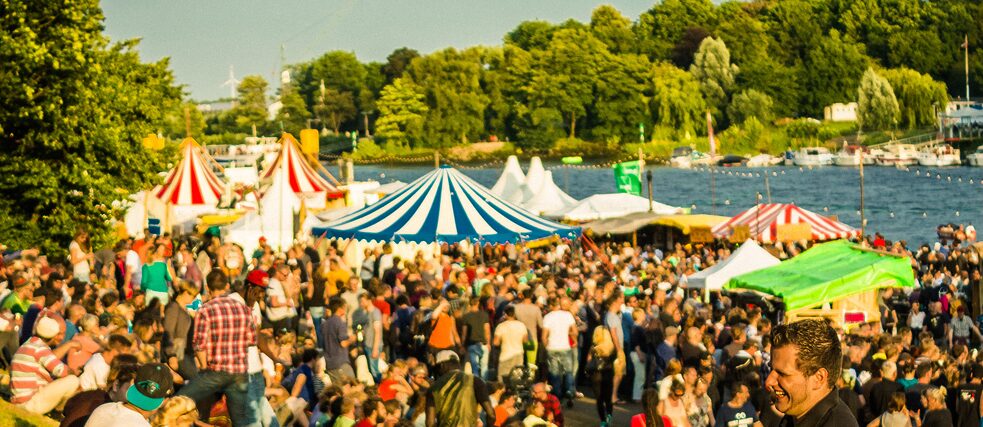 The Breminale draws culture lovers and the curious to listen to live music, watch films, hear authors read their work and more.
| Photo (detail): © Timo Hillebrand / breminale-festival.de
While it might at first sound like a cheap imitation of the Berlinale in Berlin, one of the most important annual film festivals in the world, the Breminale is an event in its own right. Scheduled for the middle of the (generally) lovely North German summer, it draws culture lovers and the curious to listen to live music, watch films, hear authors read their work and more. Since 1987, the residents of Bremen have celebrated their city over five days with a mix of pop and avant-garde and everything in between. Local culture comes into its own too with many home-grown shows and programmes. The rule of thumb – where you find the underground, the mainstream cannot be far behind – is true here too. Giants of the German music scene from Andreas Bourani to Jupiter Jones rendezvous here. While you don’t have to like it, it does emphasise the city’s vitality and generally offers a bit of something for everyone. Plus the Breminale is upholds a long tradition of being free to all comers.
The Breminale draws culture lovers and the curious to listen to live music, watch films, hear authors read their work and more.
| Photo (detail): © Timo Hillebrand / breminale-festival.de
While it might at first sound like a cheap imitation of the Berlinale in Berlin, one of the most important annual film festivals in the world, the Breminale is an event in its own right. Scheduled for the middle of the (generally) lovely North German summer, it draws culture lovers and the curious to listen to live music, watch films, hear authors read their work and more. Since 1987, the residents of Bremen have celebrated their city over five days with a mix of pop and avant-garde and everything in between. Local culture comes into its own too with many home-grown shows and programmes. The rule of thumb – where you find the underground, the mainstream cannot be far behind – is true here too. Giants of the German music scene from Andreas Bourani to Jupiter Jones rendezvous here. While you don’t have to like it, it does emphasise the city’s vitality and generally offers a bit of something for everyone. Plus the Breminale is upholds a long tradition of being free to all comers.
Hoot hoot
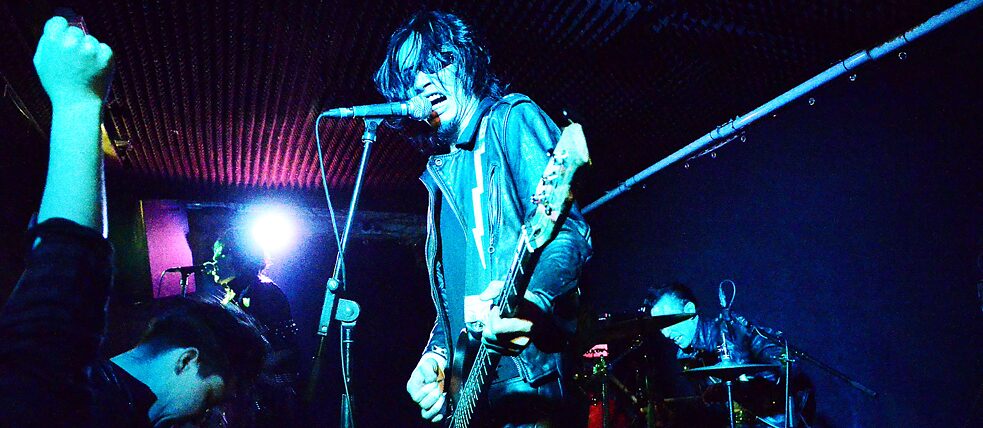 In the “Lila Eule” (Purple Owl) jazz club the charm of yesteryear is still palpable.
| Photo (detail): © Lila Eule / Oliver Schweers
Though no longer an insider tip, the Lila Eule (Purple Owl) has lost none of the spirit and soul of times gone by. It started out as a jazz club with legendary standing on the international scene. The endless parade of stars ran the gamut from Jan Gabarek to Oscar Peterson. The programme offers a bit more variety these days. Live concerts alternate with an increasing number of parties and what one might call dignified dances. But the charm of yesteryear is still palpable – especially at concerts when one to six people take the stage and give their all to win over their audience as night falls.
In the “Lila Eule” (Purple Owl) jazz club the charm of yesteryear is still palpable.
| Photo (detail): © Lila Eule / Oliver Schweers
Though no longer an insider tip, the Lila Eule (Purple Owl) has lost none of the spirit and soul of times gone by. It started out as a jazz club with legendary standing on the international scene. The endless parade of stars ran the gamut from Jan Gabarek to Oscar Peterson. The programme offers a bit more variety these days. Live concerts alternate with an increasing number of parties and what one might call dignified dances. But the charm of yesteryear is still palpable – especially at concerts when one to six people take the stage and give their all to win over their audience as night falls.
What is green and stinks like fish?
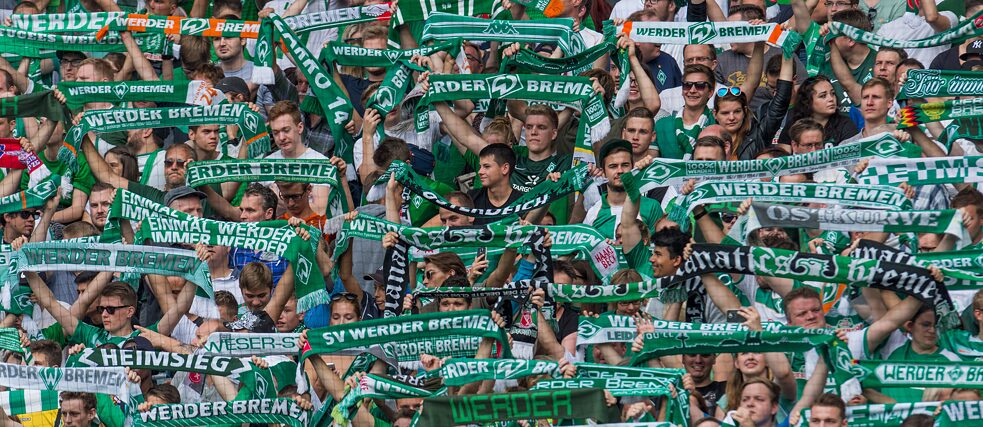 ll fans at Werder Bremen’s stadium.
| Photo (detail): © picture alliance/nordphoto
If you’ve ever seen a Werder Bremen football game, you might wonder if you heard the crowd of opposing fans right, but yes, they are singing about stinky fish. Bremen football is just as contentious as the Beck’s beer brewed in the city. An entirely undeserved reputation since, seen through the green-coloured glasses of a dyed-in-the-wool Bremer fan – Werder Bremen not only play exceptionally good football with equally exceptional fairness; the club is also a front-runner when it comes to taking a stand and working for social improvement. Along with football programmes for young refugees and a project that sponsors family holidays, Werder Bremen also leads the pack in sports opportunities for people with visual impairment and blindness. Regardless of their own personal enthusiasm for the sport, even HSV fans are likely to see the team’s appeal. (For football novices: HSV is the local rival team from Hamburg.)
ll fans at Werder Bremen’s stadium.
| Photo (detail): © picture alliance/nordphoto
If you’ve ever seen a Werder Bremen football game, you might wonder if you heard the crowd of opposing fans right, but yes, they are singing about stinky fish. Bremen football is just as contentious as the Beck’s beer brewed in the city. An entirely undeserved reputation since, seen through the green-coloured glasses of a dyed-in-the-wool Bremer fan – Werder Bremen not only play exceptionally good football with equally exceptional fairness; the club is also a front-runner when it comes to taking a stand and working for social improvement. Along with football programmes for young refugees and a project that sponsors family holidays, Werder Bremen also leads the pack in sports opportunities for people with visual impairment and blindness. Regardless of their own personal enthusiasm for the sport, even HSV fans are likely to see the team’s appeal. (For football novices: HSV is the local rival team from Hamburg.)
Who needs push-up pops from Ed von Schleck & ice cream from Langnese …
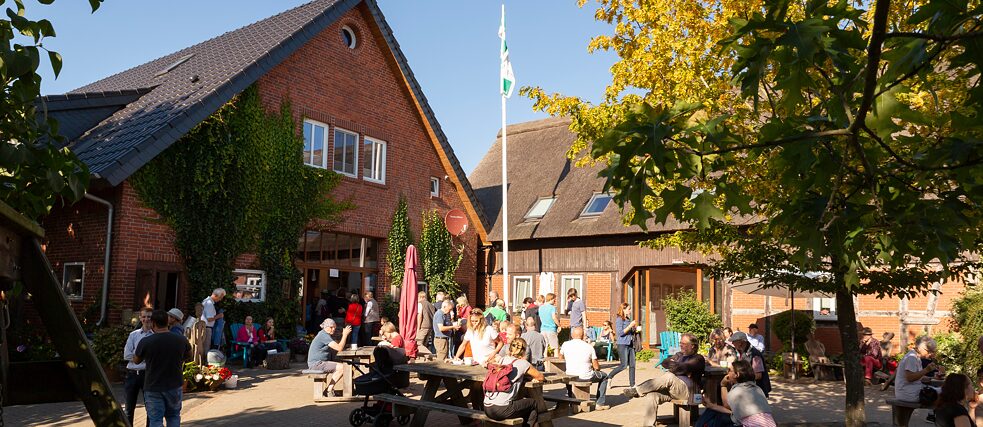 Organic ice cream made on a traditional, organic farm.
| Photo (detail): © Biohof Kaemena
… when the best cool, creamy summer-sun treat is made in Bremen! “Snuten Lekker” organic ice cream is made on a traditional, organic farm. Weather permitting, it is just a short bike ride out to the Kaemena family farm, now under the management of the ninth generation. Along with all the ice cream classics, the family café also offers a changing programme of more out-there flavours, like quark-sesame or seasonal flavours like pumpkin seed in October. The Kaemena family also offers adventure holidays and rents out holiday cottages in the former hay barn and old calf barn. Visitors interested in interacting with cows and sheep can wander around most of the organic farm – ice cream in hand to keep that sweet tooth happy.
Organic ice cream made on a traditional, organic farm.
| Photo (detail): © Biohof Kaemena
… when the best cool, creamy summer-sun treat is made in Bremen! “Snuten Lekker” organic ice cream is made on a traditional, organic farm. Weather permitting, it is just a short bike ride out to the Kaemena family farm, now under the management of the ninth generation. Along with all the ice cream classics, the family café also offers a changing programme of more out-there flavours, like quark-sesame or seasonal flavours like pumpkin seed in October. The Kaemena family also offers adventure holidays and rents out holiday cottages in the former hay barn and old calf barn. Visitors interested in interacting with cows and sheep can wander around most of the organic farm – ice cream in hand to keep that sweet tooth happy.
Hewn stone with a history
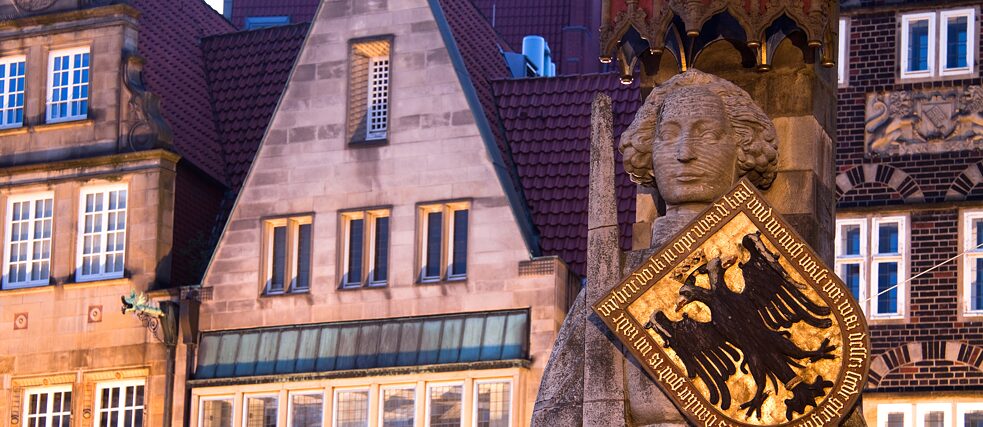 The Bremer Roland stands for the rights and freedom granted to the city of Bremen in the Middle Ages.
| Photo (detail): © Adobe/ INTERPIXELS
In classic form, this well-known landmark towers ten meters above the crowd. The Bremer Roland: imposing to look at if mildly lacklustre as an attraction; just a hewn rock really when it comes right down to it. But a rock with a rich history! There is so much behind the statue not visible to the naked eye. Roland stands for the rights and freedom granted the city in the Middle Ages. Back then, Bremen joined the Hanseatic League, a confederation of cities and merchant guilds from all over Europe that facilitated trade by land and sea among members. Since then, Bremen has staunchly defended its independence: the Free and Hanseatic City of Bremen is a city-state with its own government today. So Roland stands for pride and perhaps a bit of the local patriotism the Bremer are known for. Perhaps it is also worth mentioning that Bremen has its own city museum. But, like with any city museum, you have to have a taste for it.
The Bremer Roland stands for the rights and freedom granted to the city of Bremen in the Middle Ages.
| Photo (detail): © Adobe/ INTERPIXELS
In classic form, this well-known landmark towers ten meters above the crowd. The Bremer Roland: imposing to look at if mildly lacklustre as an attraction; just a hewn rock really when it comes right down to it. But a rock with a rich history! There is so much behind the statue not visible to the naked eye. Roland stands for the rights and freedom granted the city in the Middle Ages. Back then, Bremen joined the Hanseatic League, a confederation of cities and merchant guilds from all over Europe that facilitated trade by land and sea among members. Since then, Bremen has staunchly defended its independence: the Free and Hanseatic City of Bremen is a city-state with its own government today. So Roland stands for pride and perhaps a bit of the local patriotism the Bremer are known for. Perhaps it is also worth mentioning that Bremen has its own city museum. But, like with any city museum, you have to have a taste for it.
Life without a pug is possible...
 “Life without a pug is possible, but pointless”: The sketches and animated shorts of Vicco von Bülow, better known as Loriot, have become a New Year’s tradition in lots of families.
| Foto (Detail): © picture alliance/BREUEL-BILD
“Erna, my egg is hard!” For years now young and old have delighted in the sketches of Vicco von Bülow, better known as Loriot. But what few know is that a large portion of his antics were filmed in Bremen, in the Radio Bremen studio to be exact. Seated on the famous green couch, he moderated his show with the keen eye of a comedy genius and observer of uptight, German society. Whether looking to buy a bed or a suit, eating noodles or the fictitious “Cossack pie”, or the conversations of animated dog and elephant pair Wum and Wendelin, Loriot and his sense of humour still attract viewers and many of his comics and animated shorts are a New Year’s tradition in lots of families. In memory of the work of a man who may have been Germany’s greatest humourist, Radio Bremen created a bronze replica of the famous Biedermeier sofa. Seated atop it is the famed pug Bülow himself. This was Loriot’s favourite dog breed and as he once famously said, “life without a pug is possible, but pointless.”
“Life without a pug is possible, but pointless”: The sketches and animated shorts of Vicco von Bülow, better known as Loriot, have become a New Year’s tradition in lots of families.
| Foto (Detail): © picture alliance/BREUEL-BILD
“Erna, my egg is hard!” For years now young and old have delighted in the sketches of Vicco von Bülow, better known as Loriot. But what few know is that a large portion of his antics were filmed in Bremen, in the Radio Bremen studio to be exact. Seated on the famous green couch, he moderated his show with the keen eye of a comedy genius and observer of uptight, German society. Whether looking to buy a bed or a suit, eating noodles or the fictitious “Cossack pie”, or the conversations of animated dog and elephant pair Wum and Wendelin, Loriot and his sense of humour still attract viewers and many of his comics and animated shorts are a New Year’s tradition in lots of families. In memory of the work of a man who may have been Germany’s greatest humourist, Radio Bremen created a bronze replica of the famous Biedermeier sofa. Seated atop it is the famed pug Bülow himself. This was Loriot’s favourite dog breed and as he once famously said, “life without a pug is possible, but pointless.”
All the city is a stage
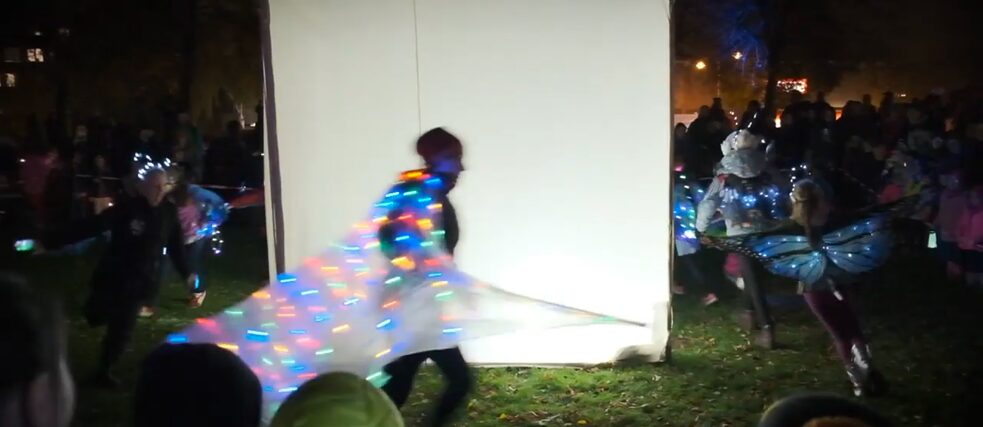 The Quartier Cultural Centre brings people together through cultural projects, such as the children video project “Lichtbox” (lightbox).
| Photo (detail): „Lichtbox“-Projekt © Screenshot https://www.youtube.com/watch?v=UPhhfviYXRM
A hub for cultural works, great ideas and impulsive expressions: the Quartier Cultural Centre in Bremen links creativity and integration and has received a number of awards for its efforts. It brings people together regardless of age, place of origin and gender to create something new, perhaps a play, a performance, a work of art or piece of music. It is organized by people who place great store in integration and inclusion. Grandparents and grandchildren tinker together at workbenches, while refugees attend writing courses and artists offer theatre projects for people with special needs. Anyone and everyone are not just welcome, but expressly invited to join in the joint expression of creativity.
The Quartier Cultural Centre brings people together through cultural projects, such as the children video project “Lichtbox” (lightbox).
| Photo (detail): „Lichtbox“-Projekt © Screenshot https://www.youtube.com/watch?v=UPhhfviYXRM
A hub for cultural works, great ideas and impulsive expressions: the Quartier Cultural Centre in Bremen links creativity and integration and has received a number of awards for its efforts. It brings people together regardless of age, place of origin and gender to create something new, perhaps a play, a performance, a work of art or piece of music. It is organized by people who place great store in integration and inclusion. Grandparents and grandchildren tinker together at workbenches, while refugees attend writing courses and artists offer theatre projects for people with special needs. Anyone and everyone are not just welcome, but expressly invited to join in the joint expression of creativity.
One last thing!
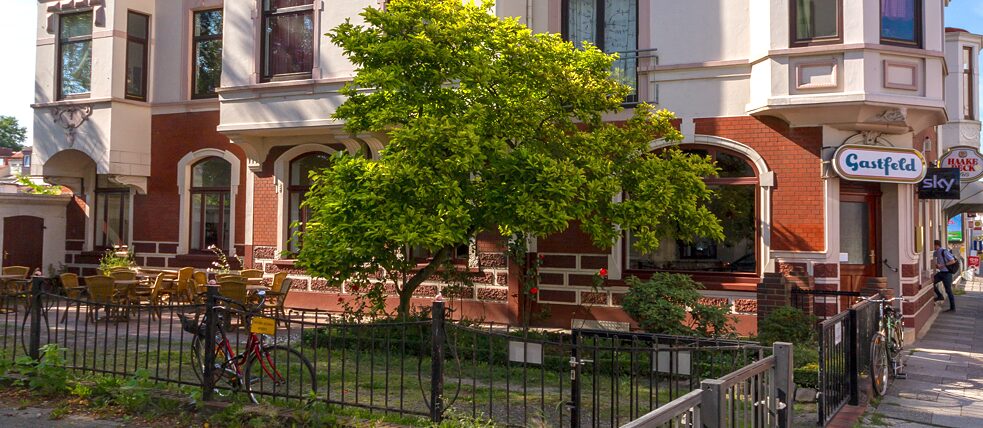 “Reading for Beer”: People from all around the greater metropolitan area come together in the “Gastfeld” pub to listen to people give drunk readings.
| Photo (detail): Matthias Süßen / Wikipedia CC BY-SA 3.0
People from all around the greater metropolitan area come together in a corner pub in the Neustadt area of Bremen to listen to people give drunk readings. It may sound odd at first, but it can be absolutely hilarious. The Reading for Beer format was the brainchild of Lucas Fassnacht and has spread to many German cities – including Bremen in the Gastfeld pub. The audience submits texts to moderator Simeon Buss and his ever changing line-up of guests and then decides by popular vote: what was better, the text itself or the performance/reading of it? There is beer either way. Lots and lots of beer. This is not your typical dramatic reading of Faust by some literary personage who has downed one too many though. Any text is fair game: crisp bags, store receipts, children’s books, entries in friendship books from 1976, love letters, instruction manuals for a new TV. 14 pieces in one night is the worst case scenario, but it always results in a unique form of entertainment as the audience laughs until it cries as a mildly blotto reader confesses his undying love for Charlotte from 7B.
“Reading for Beer”: People from all around the greater metropolitan area come together in the “Gastfeld” pub to listen to people give drunk readings.
| Photo (detail): Matthias Süßen / Wikipedia CC BY-SA 3.0
People from all around the greater metropolitan area come together in a corner pub in the Neustadt area of Bremen to listen to people give drunk readings. It may sound odd at first, but it can be absolutely hilarious. The Reading for Beer format was the brainchild of Lucas Fassnacht and has spread to many German cities – including Bremen in the Gastfeld pub. The audience submits texts to moderator Simeon Buss and his ever changing line-up of guests and then decides by popular vote: what was better, the text itself or the performance/reading of it? There is beer either way. Lots and lots of beer. This is not your typical dramatic reading of Faust by some literary personage who has downed one too many though. Any text is fair game: crisp bags, store receipts, children’s books, entries in friendship books from 1976, love letters, instruction manuals for a new TV. 14 pieces in one night is the worst case scenario, but it always results in a unique form of entertainment as the audience laughs until it cries as a mildly blotto reader confesses his undying love for Charlotte from 7B.
City Contours
Allotments in Berlin or skinny-dipping in Munich: come and explore some German cities with us – also against the grain. We give you an outline of the classic places, communities and events that are an intrinsic part of the city profile – and we redraw the contours by challenging a few clichés.
Comments
Comment